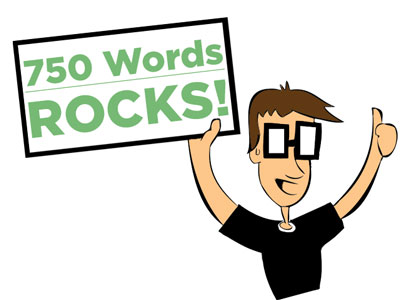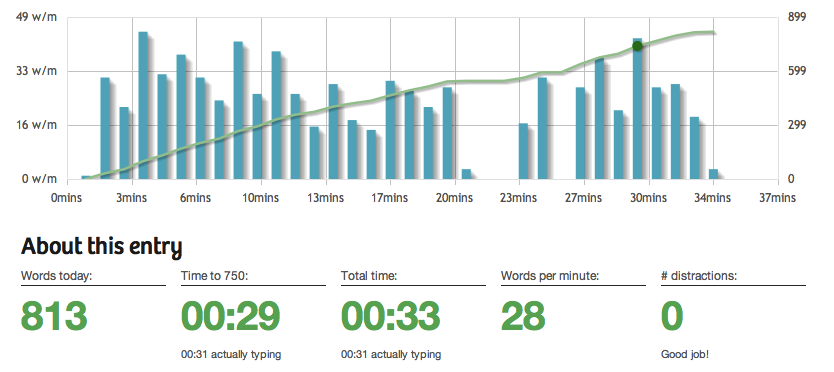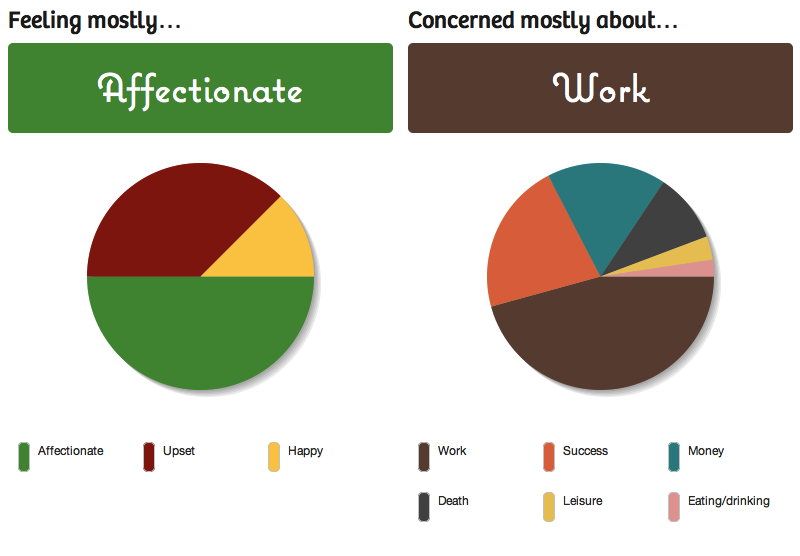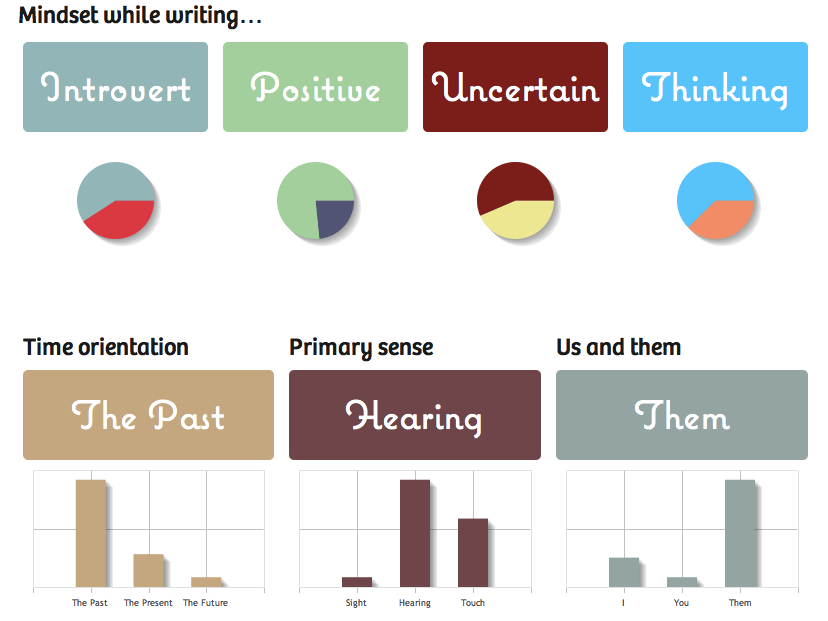 It may be a little too early to call this one, but I think 750 Words is on to something great with their website. I’ve been using it for the past week, and the experience has been nothing but pure awesomeness (which was going to be the original phrase that Wednesday was holding, but it didn’t quite fit).
It may be a little too early to call this one, but I think 750 Words is on to something great with their website. I’ve been using it for the past week, and the experience has been nothing but pure awesomeness (which was going to be the original phrase that Wednesday was holding, but it didn’t quite fit).
1. WRITING BECOMES A GAME
If you’ve ever read a “How to Write” book, chances are somewhere in there was something like this:
“If you want to be a writer, sit down at your computer and mash the keys until you have written 3 pages. Then tomorrow, rinse and repeat.”
You’re motivated and determined and this lasts a couple of days, two weeks max, before you trash the work, start over, give up all together, take a day to break, which becomes a year-long vacation, until you’re back to where you started. Sometimes writing becomes a chore, and it shows through, which only makes the editing process that more tedious and painful. So how do you make something that becomes a chore fun again?
Turn it into a game.
That’s one of the main reasons for the success behind Wii fitness, is that it takes the labor of working out and turns it into a video game. And that’s exactly what 750 Words has done, they’ve taken the labor and chore out of writing and made it fun again, and consistently.
2. SCORES AND ACHIEVEMENTS
For writing something down, you get 1 point. For writing 750 words, you get 2 points. But the key is consistency, because that’s how you unlock achievements like the first one I just got, the prized 3-days-in-a-row TURKEY. And I’m now heading toward the Penguin and learning about the various other status-creature achievements that can be obtained.

When you’re writing, this changes your whole mindset of what you’re working on. You stop worrying about whether or not, you should trash this section, because it doesn’t fit in with the rest of your book, or not counting a free write because it doesn’t contribute to the big project your working on, and on, and on. Instead, you sit down and write the 750 words, to put a big X in that empty square space at the top of your profile.
At the time of this writing, there are no bonus points, free vacation day passes, that give you points for not writing, which is great because the only way you can stay in the game is by consistently writing.
3. LINGUISTICT ANALYSIS
I was not aware of this feature before signing up, but to me, this is possibly one of the funnest parts of the website. At the end of your writing, there is a series of little graphs and charts that target what you’ve been writing about. Here’s some of mine:



4. PUBLIC SHAME / PUBLIC GLORY
Every month there’s a challenge to write everyday, all in row, without missing a single day. If you complete the challenge you unlock some awesome achievements, but if you fail, your name goes up on the Wall of Shame, to show everyone out there on the internet how much of a screw-up you are. I haven’t got the guts yet to sign up for April yet, but maybe in May. I think everyone likes being awarded for their hard-work, and awards for that daily, solitary, 3 page, writing routine rarely receives any… until now.
5. YOU CAN CUTOMIZE IT
The clincher for bringing the whole thing together, is the user’s ability to customize their interface to their liking. Here are a list of the fonts you can currently use at 750 Words:
- Arial
- Courier New
- Georgia
- Meta
- Obliqua
- Palatino Linotype
- Sharktooth
- Tahoma
- Times New Roman
- Trebuchet
- Verdana
For me, I use Google Chrome to use the website. I’ve found that when working in FireFox and IE8 that there’s a pause, when the website saves my work. So I’ll be writing… (A few seconds pass)… and then the rest of the words type themselves out in sequence after. I haven’t had this problem in Chrome. This issue may be mine alone, but if you experience something similar try Chrome.
I leave the rest of the settings the same, but type in “Georgia” with the font size being 16. It has a nice look and feel to it, and is easy on the eyes as well.
So if you still haven’t checked it out, do so, it rocks.
 After reading Use Wood Glue to Clean and Restore Old LPs, I just had to try it out on some of my unplayable records I've accumulated over time.
After reading Use Wood Glue to Clean and Restore Old LPs, I just had to try it out on some of my unplayable records I've accumulated over time.






Vocalization is not a bad habit!
It is a common habit to vocalize, or at least sub-vocalize while reading. This practice will prevent you from reading any faster than you can say the words. But vocalizing isn’t really just a habit. It actually does help you understand what you read. Sentences are usually made of multiple phrases. Each phrase is an idea, or a separate thought. When you hear a sentence spoken, there are sound clues that indicate these phrases. You may not be aware of it because it’s as subconscious as walking, but listen carefully to the previous sentence when it’s divided into phrases…
When you hear — a sentence spoken, — there are sound clues — that indicate — these phrases.
If you listen carefully to the spoken words, you will notice that the first word of each phrase is spoken in a lower pitch, like a lower musical note. Lowering our pitch indicates to the listener that this is the next thought being presented and this makes our spoken sentences easier for the listener to understand. This lower pitch tells the listener that a new part of the sentence is coming. But these audio clues are not available in written text, and so we have a tendency to sound out the words to listen for them ourselves.
There is a free online application which will take any text and convert it into its natural phrases. It will then display these phrases one after the other at your control or automatically with an adjustable speed control. Go to http://www.ReadSpeeder.com and try it out.
Although there is often more than one way to break a sentence into phrases, ReadSpeeder’s patent-pending process does a good job of quickly finding the natural, meaningful phrases. When the sentence is presented to you in this way, you no longer need to internally sound out the sentences. You will instantly grasp the meaning of each phrase at a glance, just like you grasp the meaning of words at a glance, without thinking of each letter. Faster understanding will lead to faster reading. This method is really the opposite of most attempts to read faster. The usual advice is to push your reading speed, and try to maintain comprehension, with the hope that, with practice, the comprehension will improve. With ReadSpeeder, you understand faster to begin with. Use ReadSpeeder and no longer will you be restricted to reading at the speed of speech. You will be reading at the speed of thought.
If you have any questions, you can write me at dbutler@readspeeder.com
I have to say that I disagree with your line:
“But vocalizing isn’t really just a habit. It actually does help you understand what you read.”
But research continues to show that sub-vocalized reading does not increase comprehension. This is dating back to 1900 with:
Secor, W. B. (1900). Visual Reading: A Study in Mental Imagery. The American Journal of Psychology, 11(2), 225-236.
And the computer program “read speeder” is built to eliminate subvocalization through pushing the larynx to say things faster than it physically can, which then allows the eyes to begin taking in information. So, I don’t understand why you would make a case for subvocalization, when your product helps to eliminate it.
Personally, I think the computer program is neat because it has a nice chunking feature for beginners, but once you’re reading above 800-1000 words, the feature becomes relatively useless.
Thanks for your reply Kris. I suppose you’re right that ReadSpeeder is primarily for beginners. I can see your point that it would be much less useful for those reading over 800 wpm.
I am not familiar with that 1900 study, but wouldn’t you agree that when you read a difficult passage, you naturally go back and vocalize it to better understand the meaning? Most people read in the 200 wpm range, and they tend to vocalize everything for this same reason.
I look at it this way. We’ve had spoken language way longer than printed language, and therefore are much better at communicating with the spoken word. The spoken word has lots of additional information in the form of pitch, volume, and rhythm, which is missing in text. Sounding out the text is an attempt to replace this information. Compared to the spoken word, text is like watching a video in black and white, with low resolution, and poor sound.
Now, if you are referring to ‘chunking’ as simply groups of words, I would not see much benefit to ReadSpeeder other than just pushing you to read faster. But what makes ReadSpeeder work is that it actually finds the natural, meaningful phrases. This is what makes the reading easier to understand; each phrase is a separate idea, and can be instantly recognized without thinking of the separate words.
I’m not trying to make the case or vocalization. Vocalization restricts your reading speed. But if the reader is presented a complete, meaningful phrase, they will not *need* to vocalize. The meaning of the phrase can be instantly grasped in the same way the meaning of a word can be understood without being consciously aware of the individual letters.
Anyway, it’s interesting to hear from someone with an interest and knowledge in this topic. Your comments indicate to me that http://www.readspeeder.com needs to improve its descriptions and explanations. If you have any suggestions, they would be greatly appreciated.
Thanks again for you comments.
Dave
In constructing my responses, I have written a dialogue of sorts between Dave and myself to better organize my thoughts on Dave’s comments and software:
Dave: “Wouldn’t you agree that when you read a difficult passage, you naturally go back and vocalize it to better understand the meaning?”
Kris Madden: No, I don’t agree. More and more research points to the fact that re-reading hinders comprehension. Are you familiar with psychology professor, Mark A. McDaniel, research?
The following is from The Chronicle of Higher Education (http://chronicle.com/article/C.....ite/31819):
“Don’t Reread
A central idea of Mr. McDaniel’s work, which appears in the April issue of Psychological Science and the January issue of Contemporary Educational Psychology, is that it is generally a mistake to read and reread a textbook passage. That strategy feels intuitively right to many students — but it’s much less effective than active recall, and it can give rise to a false sense of confidence.”
Dave: “We’ve had spoken language way longer than printed language, and therefore are much better at communicating with the spoken word.”
Kris Madden: To judge a system of communication based on the length of its history, reduces the importance of developing new ways of communicating with one another. It’s like saying, “We’ve ridden horses longer than we’ve driven cars, or flown airplanes, therefore it’s much better to travel by horse.” Or, “We’ve driven combustion engine cars for longer than hybrids, therefore combustion engine cars are better for travel.”
Dave: “Compared to the spoken word, text is like watching a video in black and white, with low resolution, and poor sound.”
Kris Madden: Comparing the quality of text versus speech, seems to remove the beauty of Helen Keller’s writing and suggests that the written word is an inferior form of communication. I think speech and text both have significant qualities to offer in means of communication, which is why the world still writes and talks, because we need both. I’ve stayed up late reading books that captivated my imagination and at the same time read books that put me to sleep. And I’ve listened to speeches that inspired me, and others that bored that produced less than a “black and white, with low resolution, and poor sound.”
Dave: “But what makes ReadSpeeder work is that it actually finds the natural, meaningful phrases.”
Kris Madden: Using “read speeder”, with the book “A Christmas Carol”, the program divides the line: “… and Scrooge’s name was good upon ‘Change, for anything he chose to put his hand to.” into”
“And Scrooge’s name”
“Was good upon”
“‘Change,”
“for anything he chose”
“to put his hand to.”
To me, it seems like Dickens already divided the line into meaningful phrases using commas. The program seems to only subdivide the Dickens’ original phrasing into the way the computer thinks it should be divided. For a computer to rephrase Dickens, seems presumptuous in my mind.
From Dave’s webpage: “Today, typing and email are so much faster than the old methods of hand-writing and postal-mail. Why should reading still be slow?”
Kris Madden: I agree, “Why should reading still be slow?” I don’t think having a computer divide text into smaller “meaningful phrases” is the key to accelerating a person’s reading speed and comprehension. I think there are more internal factors to take into account than external in development of a person’s reading capabilities.
Dave on September 25th, 2009 5:25 pm